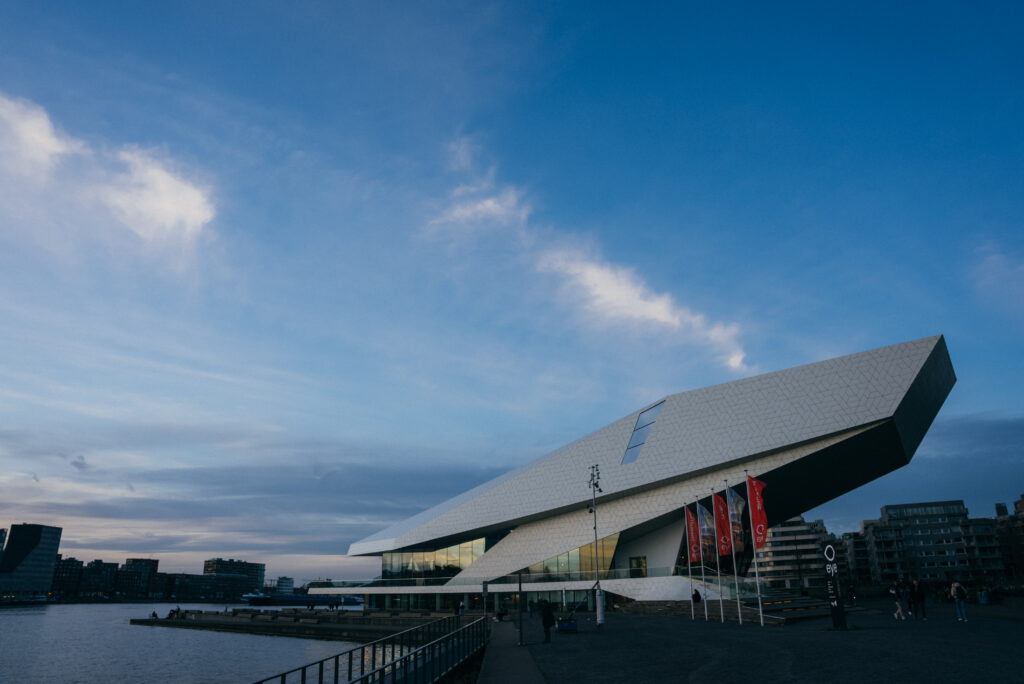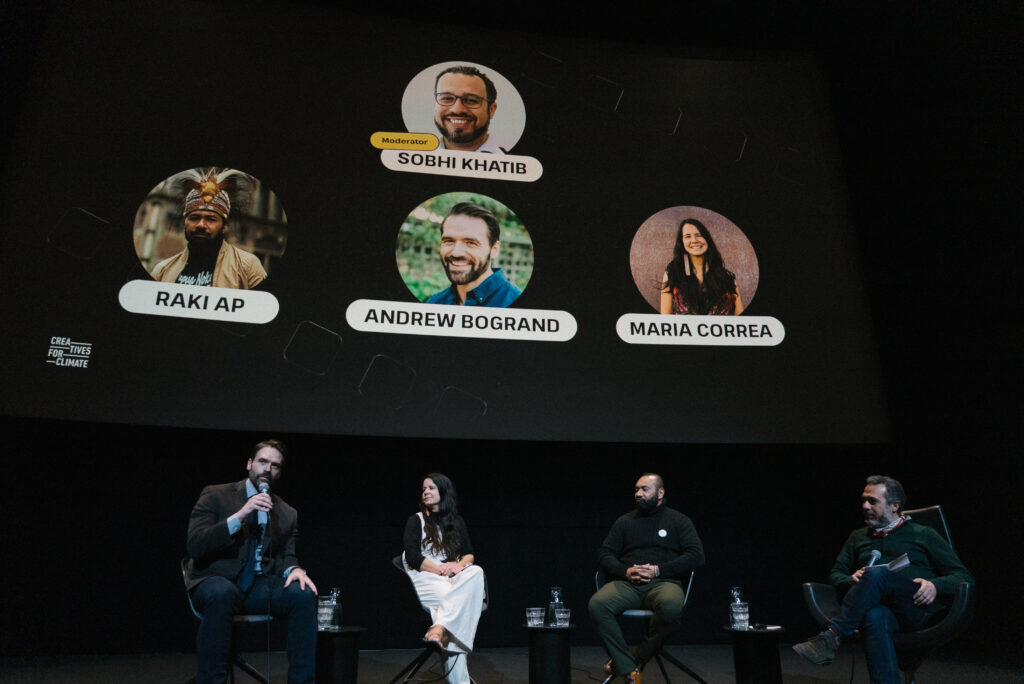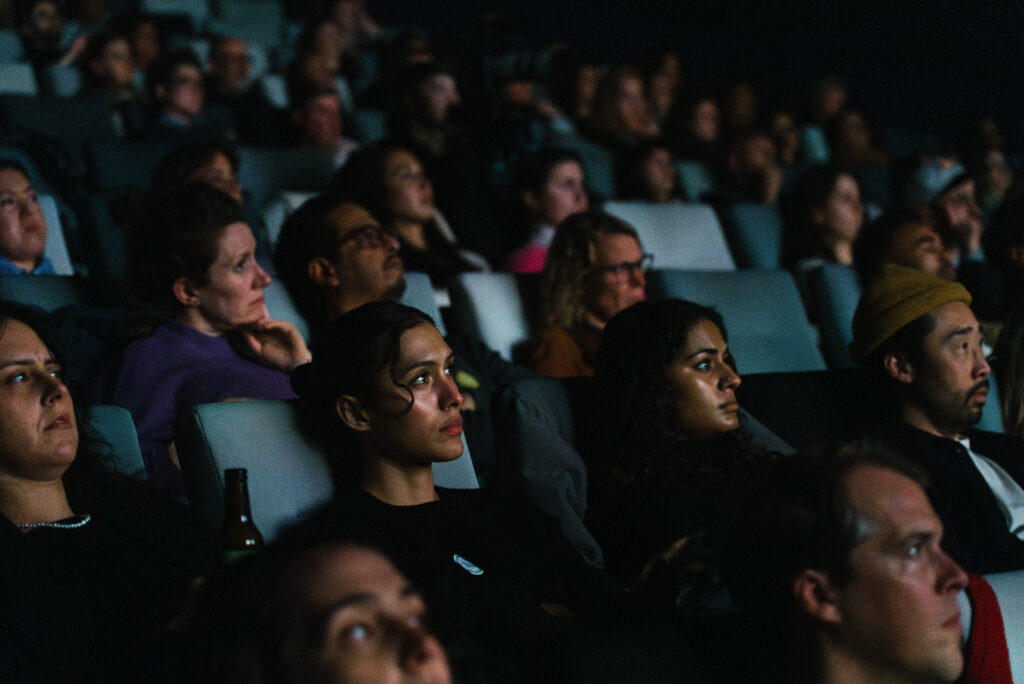Reimagining Just Futures Through Visual Storytelling
Harnessing our collective creative capacities is key to driving forward meaningful adaptation strategies and addressing the climate challenge. In a time of accelerating crisis – of a deteriorating planet, an uncertain future, and of creative alienation, the instinct to turn away from reality, to retreat into total paralysis, threatens our ability to shape a just, liveable future. In times of crisis, mobilizing action through storytelling becomes a radical act of hope, resistance, and solidarity.
On Wednesday, February 5th, a sold-out crowd of creatives, community leaders, and activists gathered at the Eye Film Museum in Amsterdam to attend Creatives for Climate’s (c4c) annual Cinema for Climate Action. Attendees were united by a shared mission: to leverage visual storytelling as a catalyst for climate action.
While the Eye’s striking main hall was filled with visitors navigating the museum’s several exhibitions, attendees ascended the main stairs to the cinema. The event was just about to kick off, and as the buzz of shared anticipation was surging, the clinking of glasses was compounded with the sound of members connected with intention over shared passions and concerns.

As guests entered into the packed cinema, Izzy Abidi, Founder and Executive Producer at Freshly Ground Stories, took the main stage to walk the audience through a series of meditations on humor, creativity, and community building. Abidi welcomed the crowd to not only participate, but to connect with their intentions for the evening. Regardless of background or expertise,everybody was urged to recognize themselves as a vital constituent of an emerging network of storytellers.
“It’s no exaggeration to say that what happens in the next five years will determine the future of life on Earth”
Abidi passed the stage to Lucy Sturmer, Founder and CEO of Creatives for Climate, who addressed and reiterated the temporal and spatial issues at stake in the climate challenge. “It’s no exaggeration to say that what happens in the next five years will determine the future of life on Earth,” she shared. Sturmer’s sense of urgency led into Andrew Bogrand’s ruminations on the intersectional connotations of human rights defense. As the Senior Policy Advisor at Oxfam America, Bogrand reflected on the idea that environmental defense is synonymous with human rights defense – as the safeguarding of a livable, just future. His poignant reminder set the tone for the evening’s first film screening: Oxfam’s America’s arresting new documentary “Hold the Line.” Co-directed by Bogrand, the film is a nuanced, visual journey through Colombia, Louisiana (USA), and South Africa, amplifying the voices of human rights defenders in their ceaseless fight against polluters. The audience was left in reflective silence, moved by the film’s poignant tribute to the power of preserving memory, Land, and purpose.
Following the first screening, Margje de Koning, artistic director at Movies that Matter, took the stage to continue the conversation with the question: What happens after we turn off the TV, having felt impacted, shocked, inspired? How do we channel this newfound impetus into action, and not paralysis? Deep understanding through a collective “unmuting” of the senses, De Koning argues, is the solution. We must dismantle defective systems through understanding, and not through antipathy. She shared that in a world of mass consumption – both materially and ideologically, movies must be impactful and succinct, and they must mark the beginning of action.
“What happens after we turn off the TV, having felt impacted, shocked, inspired? How do we channel this newfound impetus into action, and not paralysis?”
De Koning’s reflections set the stage for the evening’s panel discussion, moderated by Sobhi Khatib, founder of the Palestinian Hummus Academy. The panel featured Raki Ap, spokesperson and New Guinea specialist on Climate and Anti-Racism Activism; Maria Correa, Vice President of Marketing and Editorial at WaterBeat Network; and Andrew Bogrand of Oxfam America. Ap engaged the audience on the intersections of humanitarian-environmental crises in West Papua, emphasizing the urgency of amplifying frontline communities’ voices in the face of fossil fuel giants’ deliberate silencing. “If we don’t see and hear the decimation of frontline communities, we cannot feel for these communities – we must highlight these narratives for justice. People must believe in the power they have in their communities,” Ap observed. Bogrand and Correa advocated for film as one of the most effective mediums of storytelling, sharing anecdotes of times when their investigative and expository approach to directing involved jeopardizing their safety.

The panel led into the final screening of the night: the viral Netflix documentary “Buy More,” a subversive exposé on the fallacy of recycling and sustainability preached by large corporations. The film discloses the impacts of corporations such as Amazon and Apple on our planetary health, and lays bare practices of Greenwashing where we least expect them. Following the screening, Andrew Simms–Political Economist, founder, and campaigner at Badvertising–expanded on the theme of false advertising in his keynote about the environmental consequences of fossil fuel ads. Simms and his colleague celebrated the recent ban on deleterious advertisements in the Hague, expressing hope for expansion of stricter rules against Greenwashing in the media.
As the lights turned back on, reflective silence transformed into lively conversation between speakers and guests. Cinema for Climate Action is one of a growing number of events fostering space for creatives to build solidarity and galvanize action in their fight for the planet. At a time of increasing disconnect, these spaces provide a crucial forum for activists to break from their silos and unite forces for collective, creative storytelling.
